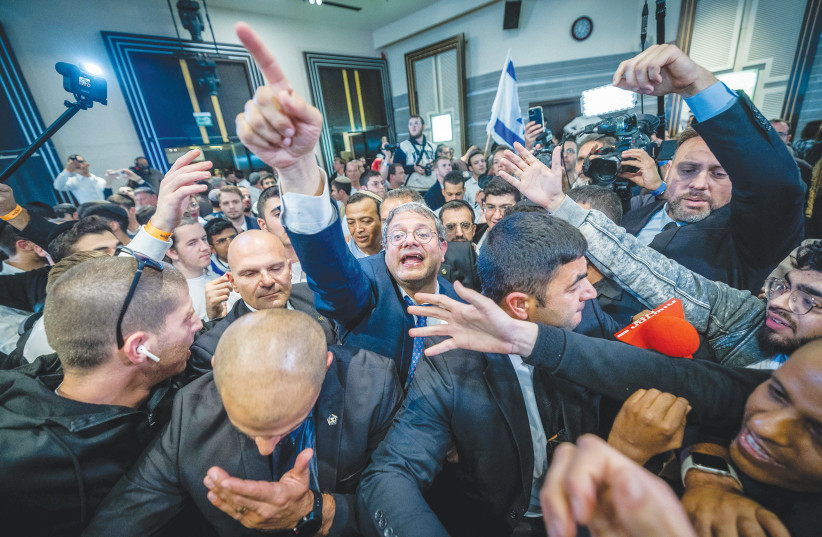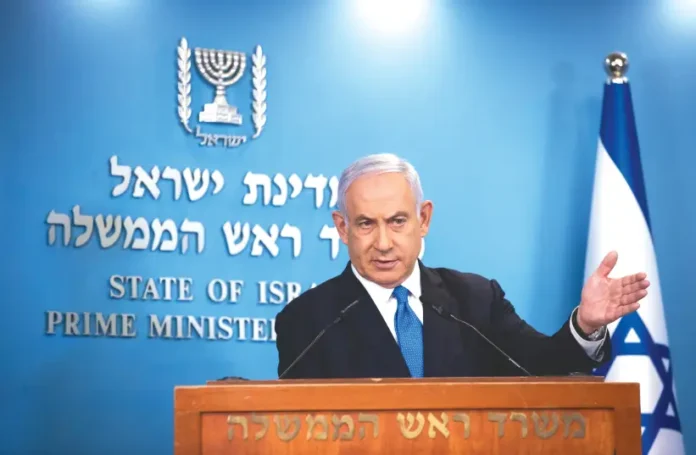DIPLOMATIC AFFAIRS: Netanyahu has long touted his diplomatic bona fides. That experience will surely serve the new prime minister well. Here are some of his challenges.
Netanyahu has long touted his diplomatic bona fides, campaigning in 2019 as in “another league” in foreign affairs and often repeating in the last year and a half, while opposition leader, that he could handle Israel’s ties with the world far better than the government in office.
That experience will surely serve the new prime minister well, since he will have a full diplomatic agenda from day one. In fact, the issues are already piling up, even before Netanyahu has even been formally tasked with forming a government. Ukrainian President Volodymyr Zelensky asked Netanyahu to change Israel’s approach to the war in his country, and American officials have expressed their concerns about Otzma Yehudit leader Itamar Ben-Gvir becoming a minister.
Here are some of the diplomatic challenges ahead for the expected Netanyahu government.

The Ben-Gvir factor
The international apprehension over Ben-Gvir has been blown entirely out of proportion in the media.
It’s not fake news; the Emirati foreign minister and members of the US Congress really did approach Netanyahu before the election. President Isaac Herzog really was caught on a hot mic expressing his honest concern to Shas MKs this week.
However, as an American diplomatic source said this week, the Americans don’t think that “coming in hot,” making a big, public fuss about Ben-Gvir, will help in any way. Washington is going to give Netanyahu the time he needs to form a government, to figure out whether there’s an alternative without Ben-Gvir or a way to sideline him.
US Ambassador Tom Nides already has experience with this situation, as deputy secretary of state under Hilary Clinton while she mostly kept her distance from Avigdor Liberman, who was foreign minister at the time and regarded as an extremist by Washington
Going back farther in Israel’s history, former prime minister Ariel Sharon was viewed in foreign capitals as an extremist and even a war criminal, but served in several senior ministerial posts, including foreign minister briefly, before his election as prime minister nearly 20 years after the Sabra and Shatilla massacre.
Ben-Gvir will not be in nearly as senior a position. And though his desired portfolio of public security is influential, it’s not one that requires a lot of direct contact with foreign officials.
The American approach is unlikely to be an announced boycott of Ben-Gvir. It’s more likely to be avoidance tactics combined with an articulation of specific policy disagreements to Netanyahu.
And in the meantime, Nides told KAN Reshet Bet that he wants a close working relationship with Netanyahu: “This is a country that is a democracy, that elected its government, and I intend to work with them,” he said on Thursday.
The rest of the world seems to be taking a similar wait-and-see approach, though the political cartoons in Arab media show that there is some anxiety in the Middle East.
Biden and Bibi are “buddies” – to a point
Even if the Biden administration will find a way around Ben-Gvir to work productively with Israel, there are other likely points of contention.
US President Joe Biden and Netanyahu go way back, four decades, to when the former was a young senator and the latter was deputy ambassador in Washington. Biden once said, in a period of great friction between Netanyahu and the Obama administration over Iran, that they’re “still buddies.”
But that long-standing relationship, and even friendship, is not going to stop Washington from speaking out if this government pursues policies that the Religious Zionist Party and much of the Likud favor with regard to Judea and Samaria.
RZP leader MK Bezalel Smotrich, for example, has asked in coalition talks for a commitment that the government would to take steps toward extending Israeli sovereignty over settlements by transferring the IDF’s authority over them to relevant government ministries. Plus, he’s for the authorization of outposts and repealing the disengagement from northern Samaria, among other things that the Biden administration would vigorously protest.
Asked about a sovereignty push from the likely incoming government, Nides said Washington “will push back against any attempt at annexation. We don’t support annexation.” That’s an understatement.
Any moves on this front will bring along condemnations from across the Middle East and Europe, as well.
Dealing with a no-deal Iran
One area in which Netanyahu may have fewer problems with Washington, London, Paris and Berlin – but especially Washington – than anticipated is Iran.
Netanyahu was as vocal as possible in opposing the Iran nuclear deal in 2015, and, since June 2021, has lamented that the government did not make its qualms about world powers’ talks with the Islamic Republic to revive the deal as public as he had.
In the departing government’s defense, it chose to be open about its objections at a key time and on issues that ended up being sticking points in the negotiations, such as removing the Islamic Revolutionary Guard Corps’ designation as a terrorist group, which Biden refused to do, and Iran’s refusal to cooperate with the International Atomic Energy Agency’s investigations. Those matters, especially the second one, contributed to a months-long delay in the talks, as did the war in Ukraine, because Russia is a guarantor of the Iran deal.
Now, it seems that the deal is mostly dead, with the US and Iran unable to reach a final agreement. As fans of The Princess Bride know, mostly dead means slightly alive, but at least for now, the Biden administration acknowledged that it is off the table.
That means Netanyahu doesn’t have to wage a public campaign opposing key Western allies’ Iran policy.
But it doesn’t mean that Netanyahu is not going to wage a public campaign related to Iran. The Islamic Republic’s nuclear program is more advanced than ever, and the mullahs’ regime continues to hide its details from the IAEA. The presumptive prime minister is likely to try to persuade French President Emmanuel Macron, German Chancellor Olaf Scholz and British Prime Minister Rishi Sunak to “snap back” sanctions on Iran to pre-2015 levels, as they are able to do as parties to the 2015 deal who didn’t leave it – which the US did in 2018. More broadly, Netanyahu will try to convince the world to admit that diplomacy failed and find other ways to crack down on Tehran – including putting a credible military threat on the table.
Two ongoing events will likely help him in his goal. First, there are the ongoing protests throughout Iran, which has sparked some Western backlash against the oppressive regime. Second, there’s Iran’s support for, and weapons sales to, Russia in the war against Ukraine, which demonstrate the point that Israelis have been making for the past decade: Iran is not only a threat to Israel; it’s a threat to the world.
A change in Ukraine policy?
Another area in which Netanyahu criticized the last government was its handling of the war in Ukraine – until Iran’s involvement became clear. Then, Ukraine policy became one of the few areas in which Netanyahu expressed support for the government.
At first, Netanyahu said Israel didn’t need to take a side. After all, Netanyahu was the architect of the deconfliction mechanism with Moscow, which allowed Israel to strike Iranian targets in Syria despite the Russian military presence there. He didn’t want to risk it. He accused Prime Minister Yair Lapid and Defense Minister Benny Gantz of “babbling” too much on the topic and creating a “crisis.”
While Israel voted to condemn Russia at the UN and provided humanitarian aid to Ukraine, the government never provided military aid, despite constant requests from Kyiv for air defense systems, because of the deconfliction mechanism.
Then came the revelations that Moscow was using Iranian drones against Kyiv and the IRGC was training Russians.
Netanyahu subtly shifted how he spoke about Ukraine, when doing a series of interviews in the US media to promote his new autobiography last month. He told USA Today that he would “look into” supplying weapons to Ukraine and would even consider mediating between Kyiv and Moscow. But on MSNBC, Netanyahu expressed concern that Israeli weapons could end up in Iranian hands if used in the Ukraine war, while praising the current policy as “prudent.”
This week, Gantz said that Israel doesn’t have the capacity to produce enough air defense systems to help Ukraine, a country whose territory is 11 times larger than Israel’s.
When he gets into office, Netanyahu will surely need to examine the implications of Iran battle-testing its weapons in Ukraine while threatening to turn them on Israel.•
www.jpost.com/israel-news/politics-and-diplomacy




